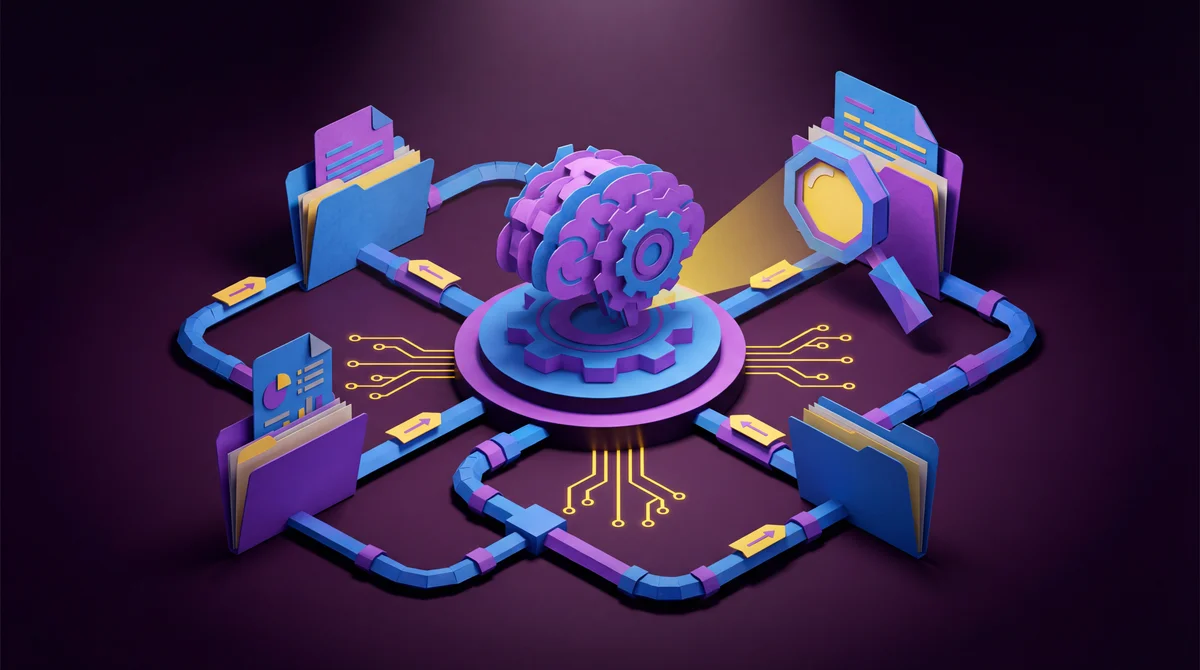Announcing Autobound’s Model Context Protocol (MCP)
One API, 400+ insight types, and AI-native personalization that actually works—Autobound's Model Context Protocol lets you build intelligent sales workflows in hours, not months.
Daniel Wiener
Oracle and USC Alum, Building the ChatGPT for Sales.

Article Content
If you're in product or engineering at a sales or martech company, you already know: content personalization is becoming table stakes. Your customers expect it. Your competitors are racing toward it. And everyone's talking about building agentic experiences.
The reality? Building personalization infrastructure is far easier said than done.
Data is fragmented. You need firmographics from one vendor, intent signals from another, social activity from a third. Each dataset has its own API, its own authentication, its own quirks. Integration takes months. Coverage is spotty. Normalization is a nightmare. And buying multiple data subscriptions? Expensive as hell.
Even if you get the data flowing, you still need to build the logic: when to fetch what, how to combine it, what to do with it. Every new feature means more custom code, more edge cases, more maintenance debt.
Autobound fixes this.
We've built the infrastructure so you don't have to. One API. 400+ insight types. Hyper-personalized content generation. And now, with Model Context Protocol (MCP), your AI workflows can intelligently orchestrate everything without brittle custom logic.
What MCP Actually Does
MCP is a standardized interface that turns Autobound's APIs into intelligent, composable tools. Instead of writing custom code to decide which API to call, when to call it, and how to combine results, your AI agents or automation systems can simply use MCP.
Think of it like this: MCP makes our APIs speak the same language as your AI. Your system can discover what's available, choose what it needs, and chain actions together automatically.
Two Core Tools, Infinite Possibilities
AI-powered sales platform Insights API
Fetch targeted data on any contact or company. 400+ insight subtypes spanning news, hiring trends, financial signals, social activity, shared experiences, and more.
Autobound Content API
Generate personalized outreach in any format: emails, multi-step sequences, call scripts, LinkedIn messages, SMS, custom content types.
Through MCP, these APIs become modular building blocks. Your AI can fetch specific insights, pass them as context to content generation, and produce the right message for the right channel, all in one orchestrated flow.
Why This Matters for You
Before MCP:
You build custom integrations for every data source. You write branching logic to decide which insights matter. You maintain separate systems for email vs. call scripts vs. sequences. You spend weeks normalizing data formats. You pay for multiple subscriptions with incomplete coverage.
With MCP:
One protocol. One integration. Your AI picks the right tool, fetches the right data, and generates the right content, automatically.
What You Can Build (Real Use Cases)
1. Intelligent Multichannel Orchestration
Your AI agent evaluates engagement history and decides: should the next touch be a new email? A follow-up? A call script?
With MCP, LLMs can intelligently determine the parameters to use, based on your request.
The prompt "write an email from daniel@autobound.ai to henry@zoominfo.com would produce a request like:
{
"contentType": "email",
"contactEmail": "henry@zoominfo.com",
"userEmail": "daniel@autobound.ai"
}
and a response like:
Subject: Podcast with Auren / James Roth's success
Hi Henry, caught your podcast with Auren on building ZoomInfo—love the growth story.
Recognizing stagnant growth (saw -5% revenue in the earnings call) and the hyper-competitive space you're in (HubSpot is moving fast), are you and James confident in your SDRs’ processes for pipeline generation?
Every CRO we meet with is struggling to get their SDRs to conduct better research and personalization... and with inboxes more flooded than ever (340B emails sent daily), every email needs to be A+...
We've built an engine that auto-generates hyper-personalized emails based on SEC filings, 10-Ks, podcast mentions, LinkedIn posts, tech used, shared experiences, and more—60-120x faster than your #1 B2B prospecting guide.
Open to exploring how we could ensure you have the pipeline needed to beat next year's revenue forecast?
Best,
Daniel
Interacting with the LLM behind the MCP could also enable the easy generation of an entire 3-step sequence at once:
"Write a 3 step cold email templates guide from daniel@autobound.ai to henry@zoominfo.com. Include the fact that henry attended a webinar yesterday"
{
"contactEmail": "henry@zoominfo.com",
"userEmail": "daniel@autobound.ai"
"contentType": "sequence",
"sequenceNumberOfEmails": 3,
"additionalContext": "Prospect attended our webinar yesterday."
}
Each email in the sequence is contextually aware of the previous messages. No extra logic needed.
2. Precision Data Fetching
Instead of guessing which insight subtypes to request, just describe what you need in natural language. The LLM behind MCP translates your intent into the right API calls.
The prompt: "Find recent initiatives with real quotes from Henry on pain points relevant to me at Autobound"
Produces a request like...
{
"contactEmail": "henry@zoominfo.com",
"insightSubtype": [
"newsCompanyInitiatives",
"socialMediaProspectPost",
"socialMediaProspectMentionedInPodcast",
"newsEarningsCall"
]
}
And returns actual insights:
Recent podcast appearance: Henry discussed on the GTM podcast how "every email needs to stand out now" and mentioned their SDRs struggle with research time vs. volume demands.
Q3 earnings call: Referenced "intensifying competition in the data space" and need to "differentiate on actionability, not just coverage."
LinkedIn post (3 days ago): Shared thoughts on AI in sales: "The tools that win will make reps faster AND better, not just faster."
Now you have real quotes, real context, real pain points - pulled automatically because you asked in plain English.
3. Email Rewriting with a User Template Seed
Your users might have templates they like, or that capture their voice. With Autobound's MCP, you can include them in content generation requests with ease. The MCP will likely use the contentToRewrite parameter.
{
"contentType": "email",
"contentToRewrite": "Subject: Quick question, {{contactName}}\n\nHi {{contactName}},\n\nWe help companies like {{contactCompanyName}} improve reply rates.\n\n[Include 2 relevant insights about {{contactCompanyName}}]\n\nInterested in learning more?\n\nBest,\n{{userName}}"
}
4. Thread in Additional Context or Instructions
If you specify, even in a very unstructured manner, context you want included in the output (notes from user's CRM, buyer signal data topics, past convo logs, etc), Autobound will thread them into additionalContext, so the output includes mention of that context.
{
"additionalContext": "Prospect downloaded our ROI calculator and attended last week's demo. Reference both naturally.",
"salesAsset": "Join us at our Dreamforce Happy Hour on Sept 18. Limited spots. RSVP at [link]."
}
The AI blends this context seamlessly into the generated message.
The Real Value
Autobound's MCP makes the enterprise-grade customization and functionality of our APIs easy to fully leverage in seconds.
One API. One protocol. Complete coverage. Dynamic personalization. Built for AI-native products.
What Makes This Different
Most "personalization APIs" give you raw data. You still have to figure out what to do with it.
Autobound gives you intelligence. The system knows which insights matter for which personas. It knows how to structure a call script vs. an email vs. a LinkedIn message. It knows how to maintain context across a multi-step sequence.
And with MCP, your AI can tap into all of that intelligence without you having to hardcode any of it.
Get Started
Autobound's MCP is live today. If you're building the next generation of sales automation, this is the foundation you want.
Documentation here ->
Talk to our team here ->
Stop building data pipelines. Start building products!

Related Articles

The Activation Moat: How GTM Teams Win When AI Thinks in Context
Most go-to-market AI tools fail because they separate data from strategy. This blog explains how Context Fusion integrates public data, private context, and AI reasoning to close the Thinking Gap and turn information into strategic action.

Sales Signals: The Complete Guide to 25+ Buying Signal Types That Actually Convert
The complete guide to 25+ sales signal types — SEC filings, earnings calls, Reddit, LinkedIn, hiring velocity, and more. Learn which signals convert highest.

ABM with AI: The Complete Guide (2026)
AI-powered ABM guide for 2026: strategy, tools compared (6sense, Demandbase, RollWorks), signal-based targeting, and ROI metrics from ITSMA and Gartner.
Ready to Transform Your Outreach?
See how Autobound uses AI and real-time signals to generate hyper-personalized emails at scale.